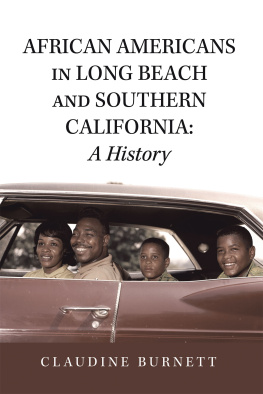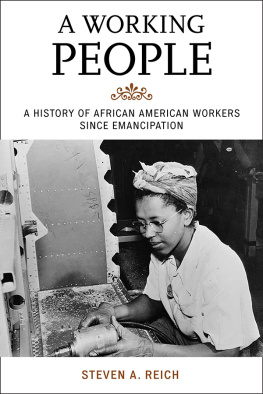The History of Public Library Access for African Americans in the South
Or, Leaving Behind the Plow
David M. Battles

SCARECROW PRESS, INC.
Published in the United States of America
by Scarecrow Press, Inc.
A wholly owned subsidiary of
The Rowman & Littlefield Publishing Group, Inc.
4501 Forbes Boulevard, Suite 200, Lanham, Maryland 20706
www.scarecrowpress.com
Estover Road
Plymouth PL6 7PY
United Kingdom
Copyright 2009 by David M. Battles
All rights reserved. No part of this publication may be reproduced, stored in a retrieval system, or transmitted in any form or by any means, electronic, mechanical, photocopying, recording, or otherwise, without the prior permission of the publisher.
British Library Cataloguing in Publication Information Available
Library of Congress Cataloging-in-Publication Data
Battles, David M., 1958
The history of public library access for African Americans in the South, or, Leaving behind the plow / David M. Battles.
p. cm.
Includes bibliographical references and index.
ISBN-13: 978-0-8108-6247-0 (pbk. : alk. paper)
ISBN-10: 0-8108-6247-6 (pbk. : alk. paper)
ISBN-13: 978-0-8108-6248-7 (ebook)
ISBN-10: 0-8108-6248-4 (ebook)
1. African Americans and librariesSouthern StatesHistory. I. Title. II. Title:
Leaving behind the plow.
Z711.9.B38 2009
027.6'30975dc22
2008028752
 The paper used in this publication meets the minimum requirements of American National Standard for Information SciencesPermanence of Paper for Printed Library Materials, ANSI/NISO Z39.48-1992.
The paper used in this publication meets the minimum requirements of American National Standard for Information SciencesPermanence of Paper for Printed Library Materials, ANSI/NISO Z39.48-1992.
Manufactured in the United States of America.

Contents

Acknowledgments
I wish to express my gratitude to the numerous people who helped to make this project a success. Annabel Stephens must be thanked for allowing me to write on this subject in her public libraries class at the University of Alabama, and it is Dr. Stephens to whom this book is dedicated. I must also thank my parents, Pete and Geraldine Battles, for their support.
Following is a list of authors whose previous works on this subject have been an invaluable aid to me, and various copyright holders who have allowed me to use their copyrighted works in this volume: Kayla Barrett, Edwin Beckerman, Bernice Lloyd Bell, Barbara A. Bishop, Lesley A. Brown, Willie Fagan Calkins, Clark E. Center, Jr., Emily Miller Danton, Donald G. Davis, Jr., G. S. Dickerman, Dennis L. Durst, M. E. Frayser, Michael Fultz, Alice Gertzog, Toby Patterson Graham, Bessie Rivers Grayson, R. D. Harris, Steven R. Harris, Anna Holden, Birdie T. James, Reinette F. Jones, E. J. Josey, Dan R. Lee, Mollie Huston Lee, Cheryl Knott Malone, A. P. Marshall, Archie L. McNeal, Eric Moon, N. Webster Moore, A. S. Nosakhere, Marilyn H. Pettit, E. E. Redcay, L. D. Reddick, S. E. Robinson, Ernestine Rose, Ann A. Schockley, George T. Settle, Louis Shores, Jessie C. Smith, Virginia Steele, John Mark Tucker, Patrick Valentine, Billie E. Walker, Andrea L. Williams, James R. Wright, and William Yust.
I apologize profusely for anyone I have managed to omit. Let it be said that I thank you, too.

Preface
The story of African Americans long struggle to attain civil rights, particularly in the South, is well documented. The story of the public library movement in America is also well, though not as thoroughly, documented. The story of the African American struggle for access to public libraries in the South has not received the attention granted the other two movements. Much of what has been written concerning this story has generally been told in piecemeal fashion in short studies or has been confined to study of the movement within a particular southern state.
The History of Public Library Access for African Americans in the South: Or, Leaving Behind the Plow examines this subject in the context of the South as a cohesive region. It brings together and examines the three distinct fields involved in this history. The first field is African American studies and involves the conditions and expectations of African Americans during this period of American history. The second field is Southern studies and involves the conditions and expectations of white southerners regarding African Americans during this period. The third field is library history, which involves the influence of the movers and shakers, as well as some of the visionaries of the national public library movement. How these three fields interact and influence one another inform the history of public library access for African Americans in the South. It is this story that follows.
CHAPTER ONE

Early African American History:
Becoming a Plow Hand
To better appreciate the importance of the long struggle for public library access for African Americans in the South, it is essential to understand the socioeconomic status of African Americans in the region during the late nineteenth and early twentieth centuries when the public library movement began in earnest in the South. It is also instructional to have an acquaintance with African American history prior to this time in order to understand the mindset of white southerners toward African Americans during the mid-nineteenth century and the events that led to this situation. Following is a brief synopsis of African American history.
While there had been black slaves in various parts of the New World prior to the seventeenth century, historians tend to date African American slavery to 1619 when a Dutch slave trader traded a group of West Africans to white merchants and farmers in the Virginia colony for needed supplies. During this same period, a severe economic crisis in Europe forced a number of white Europeans to barter passage to America in return for a set number of years labor to their benefactors. These white indentured servants often worked side by side with African American slaves. Slavery was exploited by both the North and the South.
Over the next half-century, white American society tended to ascribe an approximately equal social status to these two groups. Indeed, African Americans and white indentured servants sometimes socialized together and even intermarried. In many instances, African American slaves were allowed to work elsewhere when they had finished their daily work obligations to their
As the seventeenth century progressed, economic conditions in Europe improved, and the pool of white indentured servants eventually dwindled to zero. This put the onus of slavery exclusively on the shoulders of African Americans, which engendered a change of white attitudes toward African American slaves, especially in the South where agriculture was by far the dominant industry and where African Americans, that is, plow hands, came to be viewed as absolutely essential to the regions economy. The importance of maintaining this lucrative and almost entirely agricultural economic system did not escape the attention of southern legislators, who, by and large, gained their livelihoods from or were associated with the plantation system.






 The paper used in this publication meets the minimum requirements of American National Standard for Information SciencesPermanence of Paper for Printed Library Materials, ANSI/NISO Z39.48-1992.
The paper used in this publication meets the minimum requirements of American National Standard for Information SciencesPermanence of Paper for Printed Library Materials, ANSI/NISO Z39.48-1992.